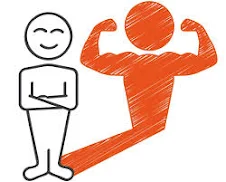Such is life, Much as we need to inject confidence from the time we wakeup everyday, our CONFIDENCE plummets OR shoots up based on a confluence of factors. BUT question is, When Does Confidence Become Too Little OR Too Much? Taking a step back, we develop our own identity as to WHO we are and self-concept as to WHAT we believe about ourselves through various processes. And one of which is SOCIAL COMPARISON which involves evaluating and even judging ourselves in relation to both the known and even the unknown as well. It then becomes habitual and an automatic process that largely operates at our subconscious level. WHAT we are cognizant of at the conscious level are the emotional effects of that comparison though📘📙📗
Those emotional effects can vary depending on if it's an upward comparison, WHERE we perceive ourselves to be better off. WHILE NOT always, upward comparisons tend to elicit negative emotions, like frustration, envy OR discouragement WHILE downward comparisons tend to be more positive emotions like gratitude, hope OR happiness. Hearing an athlete speak confidently about their past OR predicted future success would likely trigger an upward social comparison. For upward comparisons, psychologists suggest that there are three common responses: inspiration, benign envy and malicious envy💥💥💥
WHILE inspiration is WHEN you view the person's success as positive and motivating for your own personal circumstances, those feelings of benign envy may start out as frustration BUT would later lead you to produce a similar impact as inspiration, motivating you to reach a comparable level of achievement as that person✅✅✅
On the other hand, malicious envy never moves past the negative emotions that can play out as an attempt to lessen the status of the other person through criticism, condemnation OR denigration. Over to the Aussies, they commonly refer to it as 'tall poppy syndrome' WHERE people are attacked for their success and achievements, essentially cutting down the tall poppy. Indeed a 'tall order'😌😌😌
Our takeaway: Let's consider how we respond to underdogs. ISN'T it we all love a classic underdog story? The plight of someone defying the odds stacked against them, determined to be successful. WHILE underdogs in sports may be far superior OR athletes to us, they elicit emotional responses similar to downward comparisons like hope and sympathy. This happens largely because many of us identify with underdogs, recalling WHEN the odds were stacked against us at one point OR another in lives. This is the not-so-secret recipe unabated box-office successes in the movie industry because film producers and scriptwriters will exploit that human frailty to the hilt. BUT let us NOT miss figuring out WHEN CONFIDENCE either becomes TOO LITTLE or TOO MUCH❗❗❗
















No comments:
Post a Comment